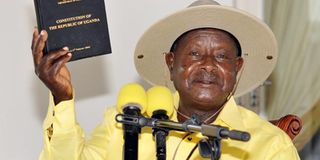Prime
‘How Museveni influenced making of 1995 Constitution’

State rules. President Museveni displays a copy of the Uganda Constitution while addressing a press conference in Mbale last year. PHOTO BY MICHAEL KAKUMIRIZI.
What you need to know:
- Mr Ofwono questions why Dr Besigye, then a delegate, did not oppose the legislation against the multi-party dispensation.
- President Museveni, argues Mr Opondo, would not kill them if they disagreed with him after all.
Kampala. Blaming fingers from former presidential candidate Kizza Besigye point in the direction of President Museveni, accusing him of directly influencing drafting of the 1995 Constitution by the Constituent Assembly.
During a local television show on Thursday, Dr Besigye said President Museveni had a direct influence on the election of the Constituent Assembly (CA) delegates.
“My 1999 paper was entirely about how subversive Museveni was to the 1995 Constitution; the 1995 Constitution was sabotaged from how CA delegates were elected; he secretly appointed committees to the districts to support candidates that would be supported by the National Resistance Army (NRA) machinery to become CA delegates,” said Dr Besigye, himself a former CA delegate.
Dr Besigye said theirs was a missed opportunity to have “the people of Uganda make the Constitution,” free from influence of the “liberators.”
NRM failure?
“We thought that we could have guns that would liberate us from the bad guns that were repressive and that our guns were liberative (sic). And that once we liberated the country from the repressive guns, then the people would have the space to now make a new constitution-that did not happen. That was the most fundamental failure of the National Resistance Movement (NRM)…not to have the people of Uganda make the constitution.”
Another CA delegate and member of the Movement Caucus, Mr Bwanika Bbaale, claims they would meet with President Museveni on a daily basis, and that he would “guide them on what decision to make on the floor.”
“We were meeting him every other day to brief him and guide us what to deliberate on the following day. He was really in control. We were meeting as NRM and he was the Chairman,” Mr Bwanika said.
The veteran politician says in what was meant to be “guidance,” the President would in effect tell them what to do.
“We would meet him every other evening and he would guide us; you can call it guiding us but he was telling us what to do, he was attending the caucus, Mr Bwanika further said.
Speaking to this newspaper on phone, former Lands Minister Daniel Omara Atubo, a former CA delegate, said President Museveni created his own “false majority”, which he used to shoot down controversial issues.
“Immediately the delegates were elected, about 214 were directly elected, but still Museveni did not have the two thirds majority. What he did for delegates from Teso and Buganda was to just buy out those people. People like Max Omeda who were voted on the multiparty platform,” he said.
Mr Atubo, a hitherto Uganda Peoples Congress (UPC) party diehard turned NRM member singles out the return to multipartism which he says was effectively frustrated by President Museveni.
Midway, he said, President Museveni dangled Cabinet positions to fence-sitting CA delegates to sway them to his side.
He also faults the appointment of late James Wapakhabulo, for whom he said he has deep respect, but that he was already part of Cabinet which he said abused the principle of separation of power.
“Why did he have a referee coming from the competing side? Museveni had the agenda of making a new constitution for his personal benefit,” said Mr Atubo.
He added: “There was this regular consultation; Museveni would meet with some delegates to form a position, which they would push through in the CA. The issues of multiparty restoration, there was pressure to undermine the independence of delegates to undermine the objectivity of delegates.”
The head of Uganda Media Centre, Mr Ofwono Opondo, rubbished the claims, saying if President Museveni influenced the CA delegates; it was a result of their own weaknesses.
“I don’t remember Dr Kizza Besigye disputing a single thing that Museveni did in that CA. The President did not have powers at all even to enter CA, even to hold meetings, even to sign the Constitution. Besigye is simply giving falsehoods to escape his personal and perhaps collective responsibility. Why did they write the Constitution the way they did?” Mr Opondo said.
Mr Ofwono questions why Dr Besigye, then a delegate, did not oppose the legislation against the multi-party dispensation.
“At that time when they agreed as the movement to lock out multi-party systems, why didn’t Besigye complain at that time? Because the situation still favoured him. He was still enjoying the bread and butter. That was their weakness, they can’t blame it on Museveni,” Mr Opondo added.
President Museveni, argues Mr Opondo, would not kill them if they disagreed with him after all.
“Did he put the barrel of a gun on their heads? Supposing they had refused, was he going to kill them? If they didn’t agree with Museveni, did he kill them?” he rhetorically asked.




